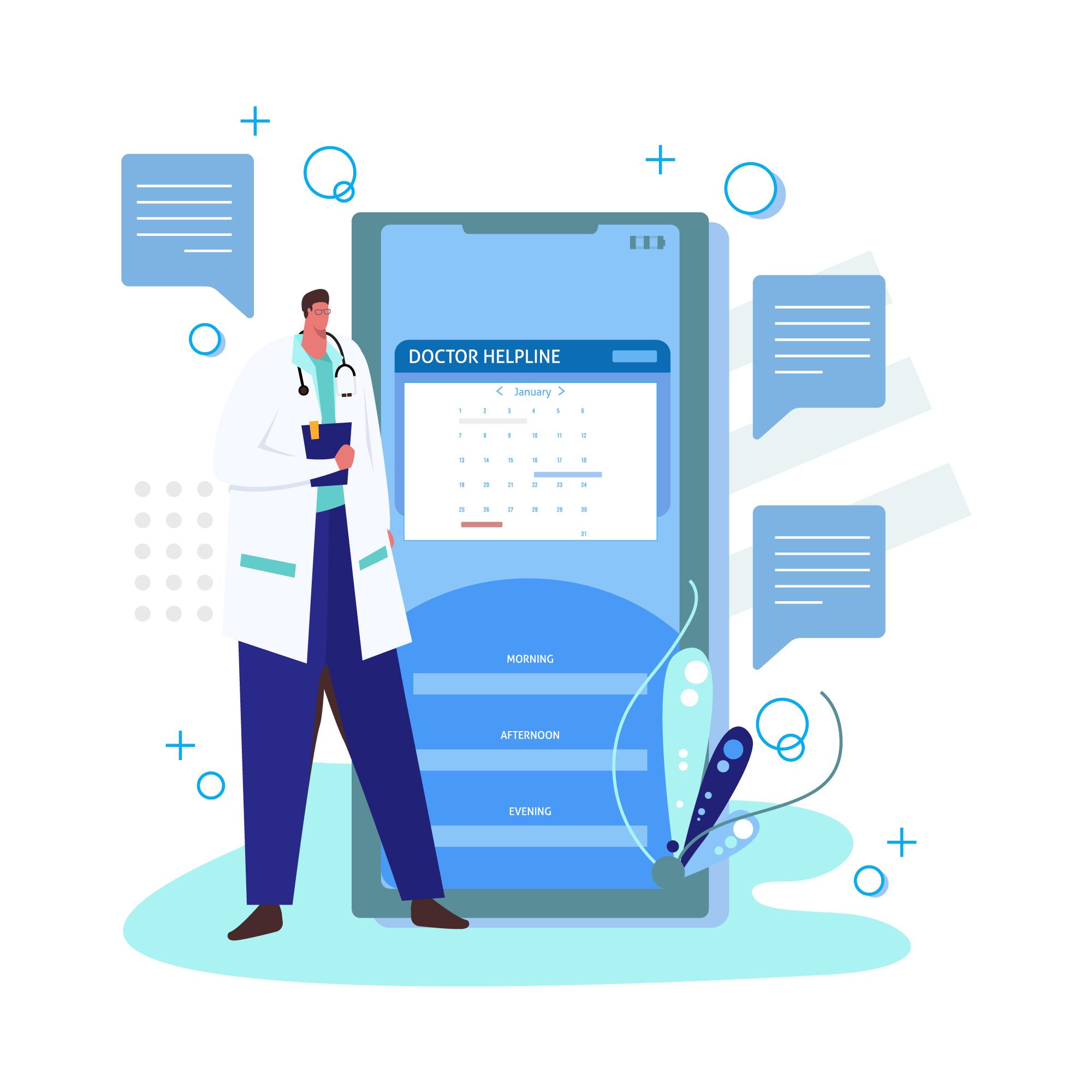In the age of digital transformation, healthcare is becoming more accessible and convenient through the development of mobile applications. One such advancement is the doctor appointment booking app, which allows patients to schedule visits with healthcare professionals from the comfort of their homes. These apps eliminate the need for lengthy phone calls, reduce waiting times, and make healthcare services more efficient.
If you are working in the healthcare business as your administrative have to spend lots of time every day booking an appointment for a patient. At this time, it’s better to have a Doctor’s appointment booking app developed. Hence it can save lots of time and money for both patients and doctors. If you are required to take all the latest advantages of the digital world and think about migrating your clinic to the digital world. You need the best Doctor appointment booking app development. Moreover, the app helps a lot in many ways by keeping the record of patients, patient medicine, medicine time, etc.
Why Doctor Appointment Booking Apps are Important
Doctor appointment booking apps have become essential tools in the healthcare industry. With these apps, patients can quickly book appointments, consult doctors online, and receive reminders about upcoming visits. For healthcare providers, these apps help in managing schedules, minimizing no-shows, and providing a better overall experience for their patients.
Here are some key benefits of the best doctor appointment booking apps:
- Convenience: Patients can schedule appointments 24/7 without needing to call the clinic during business hours.
- Reduced Waiting Times: By booking appointments online, patients avoid long wait times in clinics.
- Improved Access to Healthcare: These apps enable patients to find and book appointments with specialists, even in remote locations.
- Better Time Management for Doctors: Doctors can manage their schedules more efficiently, reducing missed appointments and maximizing the time spent with patients.
Key Features of a Doctor Appointment Booking App
When developing a doctor appointment booking app, it’s essential to include features that cater to both patients and healthcare providers. Below are some of the must-have features:
1. User-Friendly Interface
A simple and intuitive interface is crucial. The app should be easy for all users, including those who may not be tech-savvy. Patients should be able to navigate the app without confusion and book appointments with just a few clicks.
2. Doctor Profiles
Patients should be able to view detailed profiles of doctors, including their qualifications, specialties, experience, and availability. This helps patients make informed decisions when choosing a healthcare provider.
3. Search and Filter Options
An efficient search system that allows patients to find doctors based on location, specialization, availability, and even language is essential. This feature ensures that users can quickly locate the right healthcare professional for their needs.
4. Appointment Scheduling
The core function of the app is appointment scheduling. Patients should be able to view available time slots, book appointments, and receive confirmation instantly. Doctors should also have access to their schedules to manage their availability.
5. Notifications and Reminders
To minimize missed appointments, the app should send automatic reminders to patients about their upcoming visits. These reminders can be sent via push notifications, SMS, or email, ensuring that patients don’t forget their appointments.
6. Telemedicine Integration
Many of the best doctor appointment booking apps now include telemedicine services, allowing patients to consult with doctors via video call. This is especially beneficial for those living in remote areas or patients who need quick consultations without visiting the clinic.
7. Payment Integration
For a seamless user experience, include secure payment options. Patients should be able to pay for consultations or any associated fees directly through the app. Offering multiple payment methods like credit cards, mobile wallets, or insurance integration makes the process more convenient.
8. Online Medicine Delivery
An additional feature that can significantly improve the app’s usefulness is integrating an online medicine delivery app. After a consultation, patients can order prescribed medications directly through the app and have them delivered to their homes. This eliminates the need to visit a pharmacy and enhances the overall healthcare experience.
9. Electronic Medical Records (EMR) Access
To provide comprehensive care, the app can include a feature where patients and doctors can access electronic medical records (EMR). This allows doctors to review a patient’s medical history and offer better, personalized treatment. Patients can also keep track of their health records, prescriptions, and past consultations.
10. Ratings and Reviews
Including a ratings and reviews section enables patients to share their experiences with doctors. This helps new users make informed choices and gives doctors feedback to improve their services.
Steps to Develop a Doctor Appointment Booking App
Developing a doctor appointment booking app requires careful planning and execution. Below are the key steps involved in the development process:
1. Research and Planning
Before you start building the app, thorough research is necessary. Understand the market demand, analyze competitors, and identify the features that will set your app apart. This phase also involves defining your target audience—whether it’s patients, healthcare providers, or both.
2. Choose the Platform
Decide whether your app will be available on Android, iOS, or both. Given that Android has a larger user base globally, partnering with the best Android application development company can ensure that your app reaches more users. However, if your target audience uses iPhones, iOS development should also be prioritized.
3. Design the User Interface (UI)
The user interface should be designed keeping user experience in mind. A simple, clean, and visually appealing design helps ensure that users can navigate the app easily. Consider hiring professional UI/UX designers to make the app intuitive and accessible.
4. Backend Development
The backend is the backbone of any app. It handles everything from user data, appointment scheduling, and notifications to payment processing. Choose reliable and secure technologies that can scale as your app grows.
5. Integrate Third-Party APIs
Integrating third-party APIs can simplify some of the app’s functionalities. For instance, use a payment gateway API for handling payments, a location-based API for finding nearby doctors, or telemedicine APIs for video consultations.
6. Ensure Security and Compliance
Security is a top concern in healthcare apps because they deal with sensitive patient data. The app must comply with healthcare regulations like HIPAA (Health Insurance Portability and Accountability Act) in the US or GDPR (General Data Protection Regulation) in Europe. Encrypting data and ensuring that personal health information is secure will build trust with users.
7. Test the App Thoroughly
Before launching the app, extensive testing is necessary to identify any bugs or issues. Ensure the app works flawlessly across different devices, screen sizes, and operating systems. Gather feedback from beta testers to refine the app further.
8. Launch and Market the App
Once the app is tested and ready, launch it on the chosen platforms. A strong marketing strategy is crucial to make the app visible to potential users. Use social media, email marketing, and collaborations with healthcare providers to promote the app.
The Role of Online Medicine Delivery Apps in Healthcare
An online medicine delivery app is another key component in the digital healthcare ecosystem. These apps allow users to order medications online and have them delivered to their doorstep. By integrating an online medicine delivery feature within your doctor appointment booking app, you can provide a more complete healthcare experience for users.
For example, after a patient has a consultation through the app, the doctor can prescribe medication. The patient can then order the prescribed medicine through the same app, saving time and effort. This seamless integration enhances the overall user experience and makes healthcare more accessible.
Benefits of Including Online Medicine Delivery in Your App:
- Convenience: Patients can receive medications without leaving home, making healthcare more convenient.
- Timely Access to Medication: With online medicine delivery, patients can get prescriptions filled and delivered quickly, improving health outcomes.
- Increased User Retention: Offering a one-stop solution for consultations and medication increases the likelihood of users returning to the app for future healthcare needs.
Future Trends in Doctor Appointment Booking Apps
The healthcare industry is rapidly evolving, and doctor appointment booking apps are keeping pace with these advancements. Here are some of the key trends shaping the future of these apps:
1. AI-Powered Healthcare
Artificial Intelligence (AI) is playing an increasingly important role in healthcare apps. AI can assist in booking appointments by analyzing a patient’s symptoms and suggesting the most appropriate specialist. It can also help doctors manage schedules more effectively by predicting patient no-shows or cancellations.
2. Wearable Device Integration
The integration of wearable devices like fitness trackers and smartwatches will allow patients to share real-time health data with their doctors. This can help doctors monitor chronic conditions and provide more personalized treatment plans.
3. Voice-Activated Features
Voice-activated technology is becoming more popular, especially for users who may have difficulty navigating apps. In the future, users might book appointments or order medications using simple voice commands, making healthcare apps even more accessible.
Conclusion
Developing a doctor appointment booking app is a promising venture that can improve healthcare accessibility, convenience, and efficiency. By incorporating key features like telemedicine, secure payments, and online medicine delivery, your app can become an essential tool for both patients and healthcare providers. As the healthcare industry continues to embrace digital solutions, these apps will play a significant role in shaping the future of healthcare delivery.
By partnering with the best doctor appointment booking app developers and integrating modern technologies, you can create an app that not only meets today’s needs but also adapts to future trends in healthcare.


